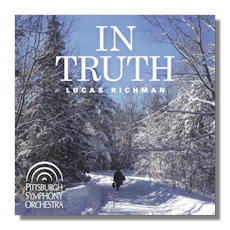
The Internet's Premier Classical Music Source
Related Links
- Latest Reviews
- More Reviews
-
By Composer
-
Collections
DVD & Blu-ray
Books
Concert Reviews
Articles/Interviews
Software
Audio
Search Amazon
Recommended Links
Site News
 CD Review
CD Review
Lucas Richman

In Truth
- Concerto for Piano & Orchestra "In Truth"
- Concerto foe Oboe & Orchestra "The Clearing"
- Three Pieces for Cello & Orchestra
Jeffrey Biegel, piano
Cynthia Koledo DeAlmaida, oboe
Inbal Segev, cello
Pittsburgh Symphony Orchestra/Lucas Richman
Recorded live, February 12, 2015, Heinz Hall, Pittsburgh
Albany TROY1583 61:73
Richman was Music Director of the Knoxville Symphony Orchestra from 2001 to 2015 and has been Music Director of the Bangor Symphony Orchestra since 2010. He was Resident Conductor for the Pittsburgh Orchestra for several years and has guest conducted many major orchestras. Over 200 orchestras have performed his works. In 2011 he received a Grammy Award for the best crossover album, Calling all Dawns. Among his commissioned works is the piano concerto recorded here, by the Knoxville Symphony, and premiered there with Biegel and Richman performing.
The oldest work here – and the one I most like – is the final one on the disc, for cello and orchestra. The middle movement, "Prayer" was written in 1989 for cellist David Low. Next came the final movement, "Freylach," (a Yiddish word meaning something like "happy" or "happiness," I believe), a folk dance with its melody developed from the one in "Prayer." The opening section, "Declaration," takes its name "from the solo cello's enunciation of 'Sh'ma Yisrael,' the watchword of the Jewish faith," Richman tells us, and serves as a prelude foreshadowing the rest. The three movements are each around six minutes.
"Declaration" opens emphatically and offers some legato melody for the cello and some contrapuntal interest. "Prayer" has an especially lovely opening followed by an assertive passage leading to a mood which becomes increasingly elevated. "Freylach" is delightful, generally quite fast, with interesting rhythms, including a swooping passage.
The Oboe Concerto, just short of seventeen minutes, is in a single movement with five sections. Richman offers a program for this piece, which he links to Psalm 23, and his title, "The Clearing," is meant to suggest "a purification of mind and spirit after having fought through the trials and obstacles with which we are faced in life." Musically, it begins and ends peacefully, quiet and slow at the start, with light scoring initially, with the oboe sounding rather birdlike, as I hear it. But then the music becomes anything but peaceful, with rising tension and a shriek from the orchestra and the oboe sounding distress in the midst of what seems like a presentation of war, with big guns making the shots in "Billy the Kid" sound like toys, especially after the brass enter the melee. After five minutes, there is a sudden cessation of violence and the oboe sounds a plaintive theme, joined with other woodwinds, with peace restored. There is some relapse into conflict, however, with fast and loud pounding, even raucous, noise, with the oboe chirping, until nearly the end, when things ease and come to an end with a thump.
The twenty-eight minute Piano Concerto "In Truth", the three movements called "To Oneself"; "To One's World"; and "To One's Spirit" also seems to have had its origins in religious reflections of the composer, who cites a Latin phrase, an Indonesian spiritual chant and Psalm 145. I shall try to describe it in purely musical terms, however.
Movement one has a bravura opening. The style of what follows – and it is all tonal – is somewhat reminiscent of Rachmaninoff's. The second movement is very different in character, with some slashing rhythms and what the composer calls "honky-tonk ragtime gone wrong." Right or wrong, I like it. The final movement, the longest at over twelve minutes, I find very appealing. Some gentle piano melody, with light orchestration, stands out, with a build up to a midway resolution emphasized briefly with an organ. There is another hint of Rachmaninoff, but just before the end the mood is very peaceful again.
The music here – always tonal – ranges from very peaceful to exciting. The performances are authoritative, and all the soloists are excellent. Biegel's playing ranges from firm delicacy to strong power. The oboist is musical and expressive, and the cellist leaves nothing to be desired.
Recommended.
Copyright © 2015, R. James Tobin




















